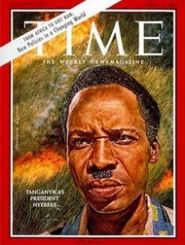This is a transcript obtained from the Time magazine. Read through the mind of Mwalimu about liberating Zimbabwe then and the then East African Community.
This was published on Monday, Mar. 14, 1977
What would happen if South Africa intervened militarily to prop up the white minority regime of Prime Minister Ian Smith in Rhodesia? Tanzanian President Julius Nyerere's answer: the five "frontline" African states that support Rhodesia's black nationalist guerrillas might well invite Soviet or Chinese intervention.
For Nyerere, 55, who led his country to independence 16 years ago, the simmering guerrilla war in Rhodesia overshadows matters much closer to home. Besides the problem of his socialist nation's faltering economy, he is confronted with the collapse of the East African Community that bound Tanzania with neighboring Kenya and Uganda in economic union, and the open hostility of Ugandan Dictator Idi Amin Dada, who accuses him of plotting an "invasion" in cahoots with former Ugandan President Milton Obote. Nonetheless, the future of southern Africa remains Nyerere's main concern, as he made clear in an hour-long interview with TIME Correspondent Lee Griggs last week at his two-story villa in Dar es Salaam:
Q. Will the insurgency in Rhodesia develop into full-scale war?
A. It is no longer a question of whether there will be war but of how much war. How much armed pressure is necessary depends on how much unarmed pressure the Western countries apply in the form of sanctions and the like. It will take a combination of these pressures to bring down Smith and make independence on the basis of majority rule possible.
Q. How could the U.S. apply pressure?
A.The U.S. can do three things. First, it can discourage Smith from believing that eventually the Western world must regard him as an ally against Communist penetration of southern Africa. Second, it must follow up with action to discourage Smith. It encourages him that you now buy his chrome openly and break sanctions. Third, you must realize that South Africa is a strong supporter of Smith. Rather than pursue past policy and use South Africa as your ally against Smith, you should realize that the politics of South Africa simply do not allow this. Instead, the U.S. and the West should say to [John] Vorster, "Look, we don't expect you to help bring about majority rule in Rhodesia. All we ask is that you not stop it."
Q. Why are you exclusively committed to the Patriotic Front [of guerrillas inside Rhodesia] as the only means to bring about majority rule there?
A. The problem is Smith, not the Patriotic Front. This fellow [with] the power has to be forced into independence on the basis of majority rule, and the Patriotic Front is doing the forcing. You cannot have a tea party for Smith and expect him to give in. He must be defeated or brought to the conference table at a point where he knows he is defeated.
Q. Tanzanian troops are training guerrillas. Do you foresee using your troops in combat against Rhodesian forces?
A. We have had experience with guerrilla fighting-and a philosophy of liberation. We helped the Mozambicans to fight by setting up training camps and passing on arms to them. We accepted risks, but they did the fighting. Our philosophy is that people must free themselves. You don't free them. It is no good our going into Rhodesia. No, this is a war of liberation, and the people have to liberate themselves. But if the war [is] internationalized and South Africa goes in on the other side, then I don't see how Tanzania could stay out.
Q. If the war is "internationalized," do you see non-Africans getting involved, such as the Cubans?
A. Cuba, Cuba, Cuba! The question is always Cuba, not the military might of the West behind South Africa. No African country or combination of African countries could be a military threat to South Africa. Yet France and others continue to arm South Africa. Why is the U.S. so worried about tiny Cuba? Or is Cuba being used as a cover-up to arm South Africa? I tell you, brother, if South Africa uses its army to prevent Rhodesia from becoming free, then we have the right to ask for support from anywhere else-and from much bigger powers than Cuba.
Q. Closer to home, the East African Community-Tanzania, Kenya and Uganda-has apparently collapsed. What can you do to save it?
A. It is a tragic thing that independent African states cannot maintain the kind of unity that the British were able to build in East Africa. We can save something only if our partners, mainly Kenya, also agree to help. We are all poor Third World countries. We should work together to build strength through unity.
Q. Ten years ago, you set Tanzania firmly on the road to socialism. What have been the successes and shortcomings ?
A. We have chosen the socialist path, but we are still miles away from success. My people are poor and ignorant. They still have to drink dirty water. Every day we are telling our people what they deserve, but we do not have the managerial or financial ability to provide it. We could do much better.
Q. What is your attitude toward recent actions by Amin in Uganda?
A. My position is well known on Uganda. I have been speaking about it for six years-ever since Amin came to power. Now that others are beginning to see what is happening there, it is time for me to shut up.
Q. Is there anything to rumors that you may soon retire?
A. When I was last elected, for a five-year term in September 1975, I asked, "Isn't it time we considered other candidates?" It has been rumored that I plan to get out ever since, but my term still has some way to run, so please, allow me my time.

